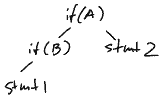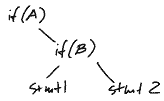if (A) if (B) stmt1; else stmt2;In the correct parse tree, the "else" belongs to the "if (B)".
In the incorrect but theoretically possible parse tree, the else belongs to the if (A).
Programming languages usually* resolve this by attaching the else to the innermost open if. (This is the way many human languages deal with similar ambiguities as well.) C does it that way, too, and so do yacc and its descendants - it's safe to ignore the warning message, as long as you know your grammar and know what it means.
A second shift-reduce conflict was introduced in C11 with the new "_Atomic" type-specifier (if followed by parentheses) or type-qualifier.
You can make Yacc not print messages about shift/reduce conflicts by announcing how many there are in the header:
%expect 2tells it to ignore one such warning. (So why didn't I include one in the grammar? Because this isn't a finished tool, just a part. I expect users to either just read or to heavily edit the grammar, and there's no point in polishing it beforehand.)
* Every once in a while, a language designer is fed up with the ambiguity and decides to eradicate it once and for all. Some otherwise ALGOL-like languages solve the problem by always requiring curly braces around their if/else parts (perl, sieve), by using closing keywords such as "fi" (ALGOL 68) or "endif" (BASIC), or by using indentation itself as a bracketing mechanism (python).
